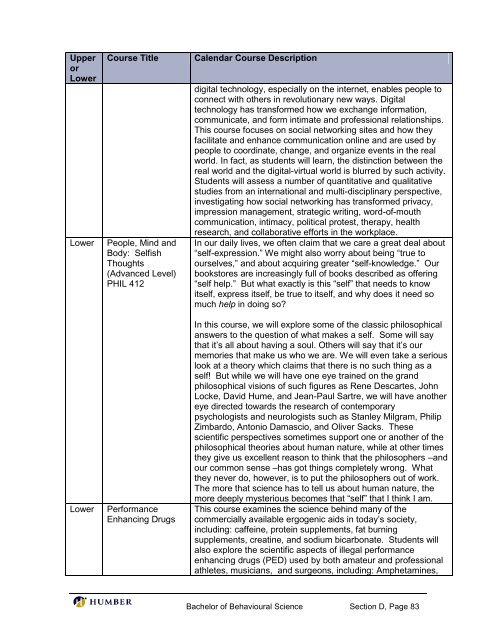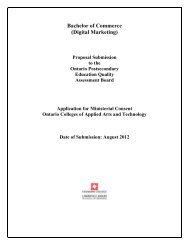Bachelor of Behavioural Science - Postsecondary Education Quality ...
Bachelor of Behavioural Science - Postsecondary Education Quality ...
Bachelor of Behavioural Science - Postsecondary Education Quality ...
You also want an ePaper? Increase the reach of your titles
YUMPU automatically turns print PDFs into web optimized ePapers that Google loves.
Upper<br />
or<br />
Lower<br />
Lower<br />
Lower<br />
Course Title<br />
People, Mind and<br />
Body: Selfish<br />
Thoughts<br />
(Advanced Level)<br />
PHIL 412<br />
Performance<br />
Enhancing Drugs<br />
Calendar Course Description<br />
digital technology, especially on the internet, enables people to<br />
connect with others in revolutionary new ways. Digital<br />
technology has transformed how we exchange information,<br />
communicate, and form intimate and pr<strong>of</strong>essional relationships.<br />
This course focuses on social networking sites and how they<br />
facilitate and enhance communication online and are used by<br />
people to coordinate, change, and organize events in the real<br />
world. In fact, as students will learn, the distinction between the<br />
real world and the digital-virtual world is blurred by such activity.<br />
Students will assess a number <strong>of</strong> quantitative and qualitative<br />
studies from an international and multi-disciplinary perspective,<br />
investigating how social networking has transformed privacy,<br />
impression management, strategic writing, word-<strong>of</strong>-mouth<br />
communication, intimacy, political protest, therapy, health<br />
research, and collaborative efforts in the workplace.<br />
In our daily lives, we <strong>of</strong>ten claim that we care a great deal about<br />
―self-expression.‖ We might also worry about being ―true to<br />
ourselves,‖ and about acquiring greater ―self-knowledge.‖ Our<br />
bookstores are increasingly full <strong>of</strong> books described as <strong>of</strong>fering<br />
―self help.‖ But what exactly is this ―self‖ that needs to know<br />
itself, express itself, be true to itself, and why does it need so<br />
much help in doing so<br />
In this course, we will explore some <strong>of</strong> the classic philosophical<br />
answers to the question <strong>of</strong> what makes a self. Some will say<br />
that it‘s all about having a soul. Others will say that it‘s our<br />
memories that make us who we are. We will even take a serious<br />
look at a theory which claims that there is no such thing as a<br />
self! But while we will have one eye trained on the grand<br />
philosophical visions <strong>of</strong> such figures as Rene Descartes, John<br />
Locke, David Hume, and Jean-Paul Sartre, we will have another<br />
eye directed towards the research <strong>of</strong> contemporary<br />
psychologists and neurologists such as Stanley Milgram, Philip<br />
Zimbardo, Antonio Damascio, and Oliver Sacks. These<br />
scientific perspectives sometimes support one or another <strong>of</strong> the<br />
philosophical theories about human nature, while at other times<br />
they give us excellent reason to think that the philosophers –and<br />
our common sense –has got things completely wrong. What<br />
they never do, however, is to put the philosophers out <strong>of</strong> work.<br />
The more that science has to tell us about human nature, the<br />
more deeply mysterious becomes that ―self‖ that I think I am.<br />
This course examines the science behind many <strong>of</strong> the<br />
commercially available ergogenic aids in today‘s society,<br />
including: caffeine, protein supplements, fat burning<br />
supplements, creatine, and sodium bicarbonate. Students will<br />
also explore the scientific aspects <strong>of</strong> illegal performance<br />
enhancing drugs (PED) used by both amateur and pr<strong>of</strong>essional<br />
athletes, musicians, and surgeons, including: Amphetamines,<br />
<strong>Bachelor</strong> <strong>of</strong> <strong>Behavioural</strong> <strong>Science</strong> Section D, Page 83
















